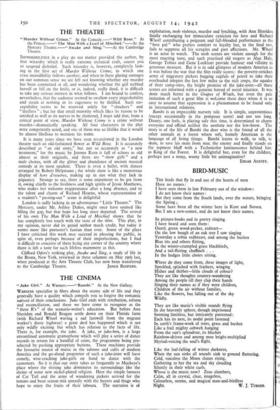"Juke Girl." At Warners.-" Bambi." At the New Gallery. THE
CINEMA
WARNERS specialise in films about the seamy side of life and they generally have a quality which compels you to forgive the romantic naiveté of their conclusions. juke Girl ends with retribution, reform and reconciliation, and these we have come to recognise as the " three R's" of the scenario-writer's education. But before Ann Sheridan and Ronald Reagan settle down on their Florida farm (with Richard Whorl waving a sad farewell from the migrant worker's dusty highway) a great deal has happened which is not only wildly exciting but which has relation to the facts of life. There is, for example, the juke. A juke, or juke-box, is a large streamlined automatic gramophone which will play a series of dance records in return for a handful of coins, the programme being pre- selected by pushing appropriate buttons. These machines provide the favourite source of music in the saloons and cafés of modern America and the go-ahead proprietor of such a juke-joint will have comely, wise-cracking juke-girls on hand to dance with the customers. So it is that our story takes us frequently to Muckeye's place where the shining juke dominates its surroundings like the shrine of some new nickel-plated religion. Here the simple farmers of Cat Tail and the army of wandering pickers arrived for the tomato and bean season mix uneasily with the buyers and thugs who hope to enjoy the fruits of their labours. The narrative is of exploitation, mob violence, murder and lynching, with Ann Sheridan finally exchanging her immaculate cynicism for love and Richard Whorl contributing a poignant and full-blooded performance as the " best pal " who prefers comfort to loyalty but, in the final test, fails to suppress all his scruples and past affections. Mr. Whorf is an actor to watch. The mob scenes are violent enough for the most exacting taste, and such practised old stagers as Alan Hale, George Tobias and Gene Lockhart provide humour and villainy in generous measure. But it is in odd glimpses of modern America as it was before the war that the film really scores: the poverty-stricken army of migratory pickers begging cupfuls of petrol to take their overloaded jalopies the last few miles to the rich crops, the squalor of their camp-sites, the bright promise of the juke-joint--all these scenes are informed with a genuine hatred of social injustice. It was done much better in the Grapes of Wrath, but even the pale imitation of such a great film is welcome these days when it is so easy to assume that oppression is a phenomenon to be found only in international relations.
Bambi is an impeccable nursery tale. It is simple, unpretentious (except occasionally in the pompous score) and not too long. Disney, one feels, is playing safe this time, is determined to charm everyone and offend neither the aesthete nor the low-brow. The story is of the life of Bambi the deer who is the friend of all the other animals in a forest where soft, homely American is the language of all living things. Bambi learns to walk, to talk, to skate, to save his mate from man the enemy and finally stands on the topmost bluff with a Technicolor luminescence behind him as King of the Forest. It is delightful but, even for the children, perhaps just a teeny, weeny little bit unimaginative?
EDGAR ANSTEY.






















 Previous page
Previous page